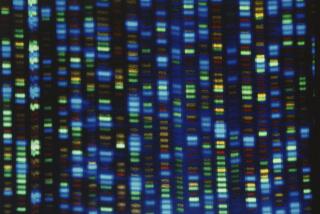NONFICTION - Dec. 25, 1994
- Share via
EVOLUTIONARY MEDICINE: Rethinking the Origins of Disease by Marc Lappe. (Sierra Club Books: $30; 255 pp.). One of the great weasel phrases of science, as even most scientists will agree, is “ . . . provided all other variables are kept constant.” It’s a momentous qualification, for in real life variables vary--almost invariably, one wants to add--and render true statements inaccurate nanoseconds after they’ve been uttered. That’s the issue at the heart of “Evolutionary Medicine,” although Marc Lappe, a pathologist and director of the Center for Ethics and Toxic Substances in Gualala, states it more narrowly; he argues that by looking at diseases such as AIDS, malaria, tuberculosis, etc., in frozen, “snapshot” form rather than as ever-evolving products of an ever-changing environment, the medical Establishment has limited its chances to eradicate or ameliorate them. One simple fact demonstrates the power of Lappe’s case: some bacteria can pass through 30 generations in a single day, meaning that they can mutate into new, antibiotic-resistant forms almost before the physician has turned his back. One problem with modern medicine, Lappe writes, is that doctors, being trained to treat individual patients, may worsen the health of the species as a whole; by over-prescribing antibiotics, utilizing outdated courses of chemotherapy and ignoring viruses’ ability to reproduce quickly, they end up creating broadly resistant bacteria, cancer cells unresponsive to numerous drugs and more potent viruses. There is hope, however; perhaps the most fascinating section of the book is Lappe’s brief discussion of one speculative AIDS treatment, a “controlled selection” in which a patient’s HIV virus is encouraged to back-mutate into a form susceptible to, say, AZT. “Evolutionary Medicine” is full of such thought-provoking proposals, but most valuable in providing a new lens through which to view intractable medical problems. It’s only reasonable to think that medicine, itself a product of nature, is more likely to make progress working with natural forces rather than by bending them to its will.






